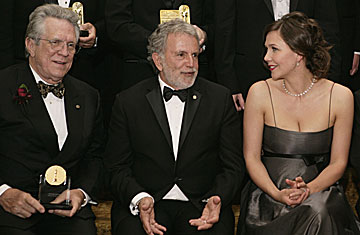
Maggie Gyllenhaal, right, talks with Academy President Sid Ganis, center, and John A. Bonner Medal of Commendation winner Richard Edlund at Oscar's annual Scientific and Technical Awards ceremony in Beverly Hills, California, February 11, 2007. Gyllenhaal presented the awards.
It happened Feb. 10, as it does each year at the Academy of Motion Picture Arts and Sciences' Scientific and Technical Awards, the brainy Hollywood gathering that merits about a one-minute summary at the prime-time Oscars. The event, held this year at the Beverly Wilshire Hotel in Beverly Hills, Calif. and hosted by Maggie Gyllenhaal, honors the unsung heroes of show business, the men behind the men behind the movie — making gadgets that make men like Peter Jackson and George Lucas look so smart.
From the lack of paparazzi to the crowds of rowdy Ph.D.s at the best tables to the fact that the women in attendance ate carbohydrates, almost nothing about the SciTech Oscars resembles its glitzier counterpart held later this month at the Kodak Theater. No one asked the guy who designed the mysterious-sounding Brugmatic MPST Densitometer who he is wearing. No one speculated if the woman who helped the film industry convert from silver-based to cyan dye analog soundtracks is finally over her ex. No one thanked his agent — although the computer science department at MIT did get name-checked.
To add a little razzle-dazzle to its low-key roster, each year the Academy enlists a hot young actress to host the SciTech awards. In the past Scarlett Johansson and Rachel McAdams have done the honors. This year Gyllenhaal took on the challenge of describing work like that of winner Florian Kainz, for the design of OpenEXR, a system, the Sherrybaby star said, "engineered to meet the requirements of the visual effects industry by providing for lossless and lossy compression of tiered and tiled images." There's a reason the Academy recruits smart actresses for this event — you wouldn't entrust Jessica Simpson with words like "lossy."
And yet, issuing the disclaimer that she fulfilled her college science requirement by taking earth science, and then squinting into the teleprompter, Gyllenhaal said, "I suspect this is kind of a joke you SciTech guys like to play on an unassuming actress." In handing over the 15 awards, she also had to contend with a fair number of male recipients who seemed so awed by the presence of a live woman outside of an Internet chat room that they had difficulty forming complete sentences.
But it was the techie bigwigs who were this crowd's brightest stars. Star Wars effects czar Richard Edlund received the John A. Bonner Medal of Commendation and a standing ovation. Visual effects software developer Ray Feeney took home the coveted Gordon E. Sawyer Award, coveted because it is the only actual Oscar statuette given (the other awards are plaques, medals and certificates). Also honored were the creators of something called the Rosetta Process, which will ensure safekeeping of today's movies for some 1500 years. Joshua Pines, who won for another digital archiving technique, clearly understood both the positive and the negative ramifications of his work, thanking the Academy "for recognizing our efforts to preserve films for future generations, even if it is Norbit." Another group won for the FI+Z or "Fizz System." Some of us wondered if this was how stars' trailers were kept stocked with Diet Coke, until we learned it has something to do with cameras.
There were some actual stars in the ballroom — O.K., so there was Ed Begley Jr. and a bunch of guys who looked like Kenny Rogers. An alarmingly large number of scientists from Austria received awards. Apparently the people who gave the world Mozart and World War I are really good at making wireless camera lens controls. We tried to pin them down as part of some kind of vast, Austro-techie conspiracy, but, like the rest of the contented crowd at this Oscars, the Austrians were too friendly to root against.
Also, we learned that rooting against someone would have been really stupid, because the SciTech Award winners are chosen long before the event in a deliberative process a lot more like evaluating a doctoral thesis than watching a DVD of Little Miss Sunshine. And in fact, everyone at the ceremony had reason to be happy, be they a winner, a member of the Academy, or a date willing to laugh at math jokes for an excuse to get dressed up and eat filet mignon.
Some of the recipients savored the moment by recalling how far they'd come — like the proverbial "I remember when I was just working as a waitress" story, there was the "I remember when I was just working on baggage X-ray machines" recollections. Where the regular Oscars show clips from the nominated films, the SciTech awards show clips from labs, pictures of graphs and charts, rows of scientists bent diligently over their computers. "An award like this is a rare and beautiful thing," said Colin Davidson, honored for his work on 3D modeling. "An award like this to a geek is a rare and beautiful thing squared."
